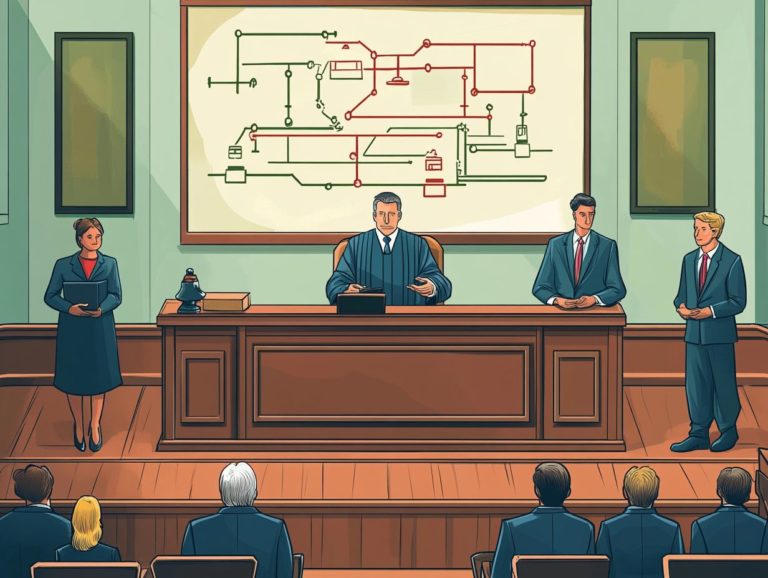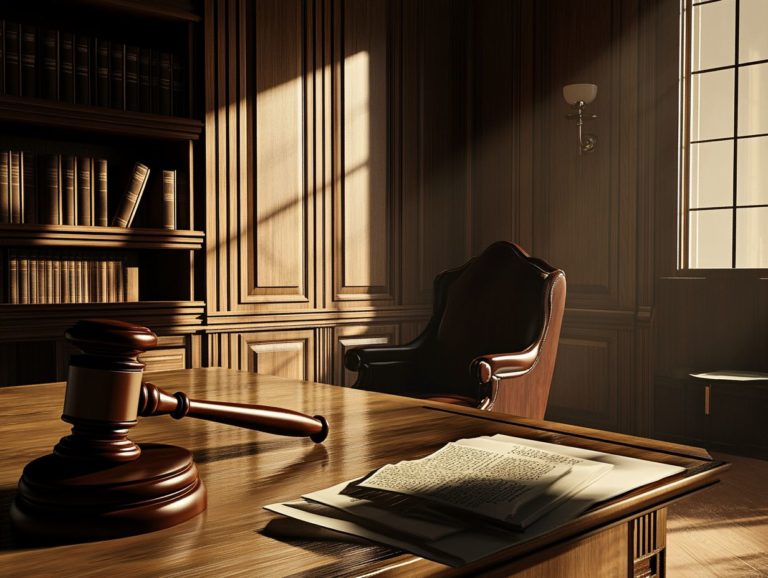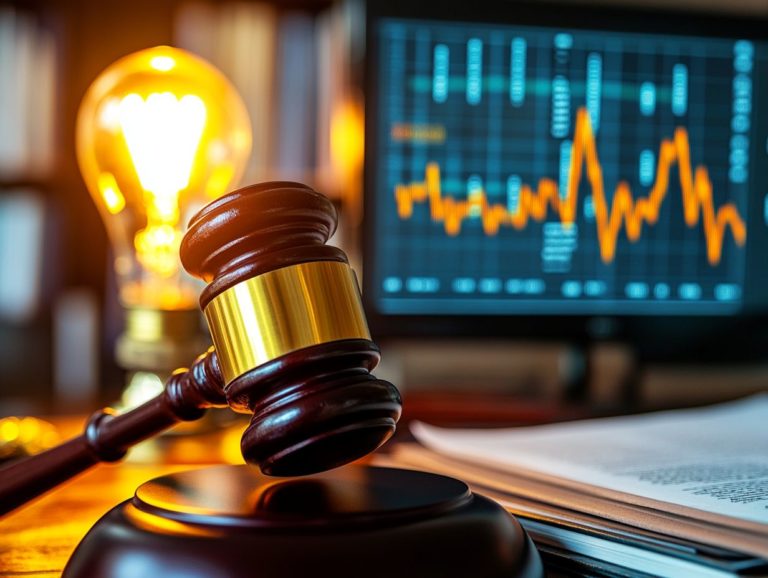5 Lessons Learned from Major IP Litigation Cases
In today s fast-paced business landscape, safeguarding your intellectual property (IP) has never been more essential. With innovation at the forefront of competition, grasping the nuances of IP litigation could be the pivotal factor that separates triumph from costly setbacks.
Discover five vital lessons that you can’t afford to ignore! This article delves into crucial insights gleaned from significant IP cases. It emphasizes the necessity of protecting your creations, the financial ramifications of legal disputes, and the critical role of evidence and contracts. It also examines how social media impacts IP disputes and provides practical insights to help you navigate this intricate terrain with confidence.
Contents
- Key Takeaways:
- 1. Importance of Protecting Intellectual Property
- 2. The Cost of Litigation
- 3. The Role of Evidence in IP Litigation
- 4. The Need for Clear and Comprehensive Contracts
- 5. The Impact of Social Media on IP Cases
- What Are Some Common Types of IP Litigation Cases?
- Frequently Asked Questions
- What are the 5 most important lessons learned from major IP litigation cases?
- How can protecting your intellectual property from the outset prevent major IP litigation cases?
- What are the potential consequences of not properly protecting your IP?
- Why is thorough research and due diligence important before filing an IP claim?
- What are the complexities of navigating the legal system in IP cases?
- How can major IP litigation cases set precedents for future cases?
Key Takeaways:

Protect your IP to avoid costly legal battles.
The financial burdens of IP litigation can greatly impact a company’s resources and reputation.
Strong evidence and contracts are key to proving your ownership.
1. Importance of Protecting Intellectual Property
Protecting your intellectual property (IP) is essential for your business. It protects your hard-earned innovations and enhances your brand’s visibility.
By ensuring robust IP rights, you can commercialize your advancements and strengthen your market position. This helps you grow your business in new areas while minimizing the risks associated with unauthorized use or infringement.
A strong IP framework gives you the power to leverage your assets strategically. This can attract potential partners for risk-sharing and collaborative ventures.
In various industries, IP protection is pivotal in driving progress and creativity. Take Chelsea, for instance; they leverage trademark rights to cultivate brand loyalty and maintain their reputation in a fiercely competitive market. Similarly, Caltex utilizes patented technologies to lead the way in fuel efficiency and environmental sustainability.
This dedication to IP creates a fertile ground for growth and collaboration. It also reassures investors about the potential returns on their investments. Ultimately, managing your IP rights with diligence enhances your company’s reputation, instills confidence in consumers and stakeholders, and solidifies your presence in the market.
2. The Cost of Litigation
The cost of litigation in intellectual property disputes can indeed be staggering. This often leads you to rethink your strategies for patent enforcement and the associated commercial risks.
These financial burdens extend beyond just the immediate legal fees, which can soar into the thousands or even millions of dollars depending on the complexity and duration of the case. You also have to factor in potential damages that can escalate dramatically if your company loses.
Take, for example, the landmark trademark dispute between Nike and Pharrell Williams. The outcome didn’t just impact brand reputation but also resulted in substantial compensatory damages and legal costs that far exceeded initial projections.
Many businesses get caught in a costly cycle of litigation that can surpass industry averages. This forces them to carefully consider the risks versus the benefits of pursuing or defending such claims.
3. The Role of Evidence in IP Litigation
In intellectual property litigation, the role of evidence is absolutely paramount. It s what ultimately determines the outcome of disputes surrounding IP rights, trademark validity, and patent enforcement.
You ll find that various forms of evidence are crucial in these cases. For instance, documentation of prior use can establish the timing and originality of a claim. Licensing agreements shed light on the intentions and limitations agreed upon by the parties involved.
Expert testimony can also be invaluable. It provides insight into the technical aspects that help courts navigate the complex issues surrounding IP.
Notable cases, particularly those handled by the Australian Competition and Consumer Commission (ACCC), have shaped the legal landscape by enforcing stricter compliance measures. This reinforces the idea that robust evidence is essential for safeguarding intellectual property rights.
4. The Need for Clear and Comprehensive Contracts

Clear and comprehensive contracts are vital for effective IP licensing. They dictate terms of use, establish rights, and outline critical termination rights to protect all parties.
These agreements must address the scope of the license. This includes how the intellectual property can be used, shared, or modified.
For instance, in the energy sector, companies like Chevron navigate licensing agreements to foster technology transfer and innovation. This helps them maintain a competitive edge.
By including clear definitions and expectations, agreements prevent misunderstandings during collaboration.
Clauses on payment structures, quality control, and dispute resolution enhance contract effectiveness. This fosters a cooperative spirit while protecting the interests of licensors and licensees.
5. The Impact of Social Media on IP Cases
Social media has reshaped intellectual property cases. It amplifies brand exposure but also increases risks of trademark infringement and piracy.
This presents a challenge when managing and protecting creative assets. Consider the estate of Marvin Gaye, which successfully sued artists like Robin Thicke for copyright infringement.
Such instances show how social media can both enable sharing and create opportunities for IP violations. Navigating these waters requires vigilance.
You must create strategies to monitor usage and enforce your rights effectively. This often means balancing engagement with protection.
What Are Some Common Types of IP Litigation Cases?
You might encounter various IP litigation cases, including patent infringement, trademark disputes, and copyright violations. To navigate these complexities effectively, consider following 5 tips for IP litigation success, as each type poses unique challenges and risks.
Trademark disputes illustrate this well. The case involving Regency Media shows how companies navigate complex legal landscapes when their brands are threatened.
Here, the Trade Marks Act 1995 outlines the standards for registering and enforcing trademarks in Australia. The Australian Competition and Consumer Commission (ACCC) regulates these disputes, ensuring fair competition.
This regulatory oversight protects not just the involved parties but also market integrity. Such an environment promotes innovation and consumer trust.
What Are the Steps Involved in an IP Litigation Case?
IP litigation involves several legal processes. It starts with an initial investigation, then filing a complaint, progressing to patent enforcement, and potentially leading to settlement.
Understanding these stages is crucial for any business facing IP issues. To stay informed, consider the recent trends in IP litigation, as a strong legal strategy can significantly influence outcomes.
During the initial investigation, gather evidence and documentation to support your claims. Filing a complaint is a critical step where you must clearly state the legal basis for your case.
As you move toward patent enforcement, remain vigilant about common pitfalls. Missing procedural deadlines or misjudging your position can be detrimental.
Engaging experienced legal counsel early and maintaining organized records can enhance your chances of a favorable resolution.
How Can a Business Avoid IP Litigation?
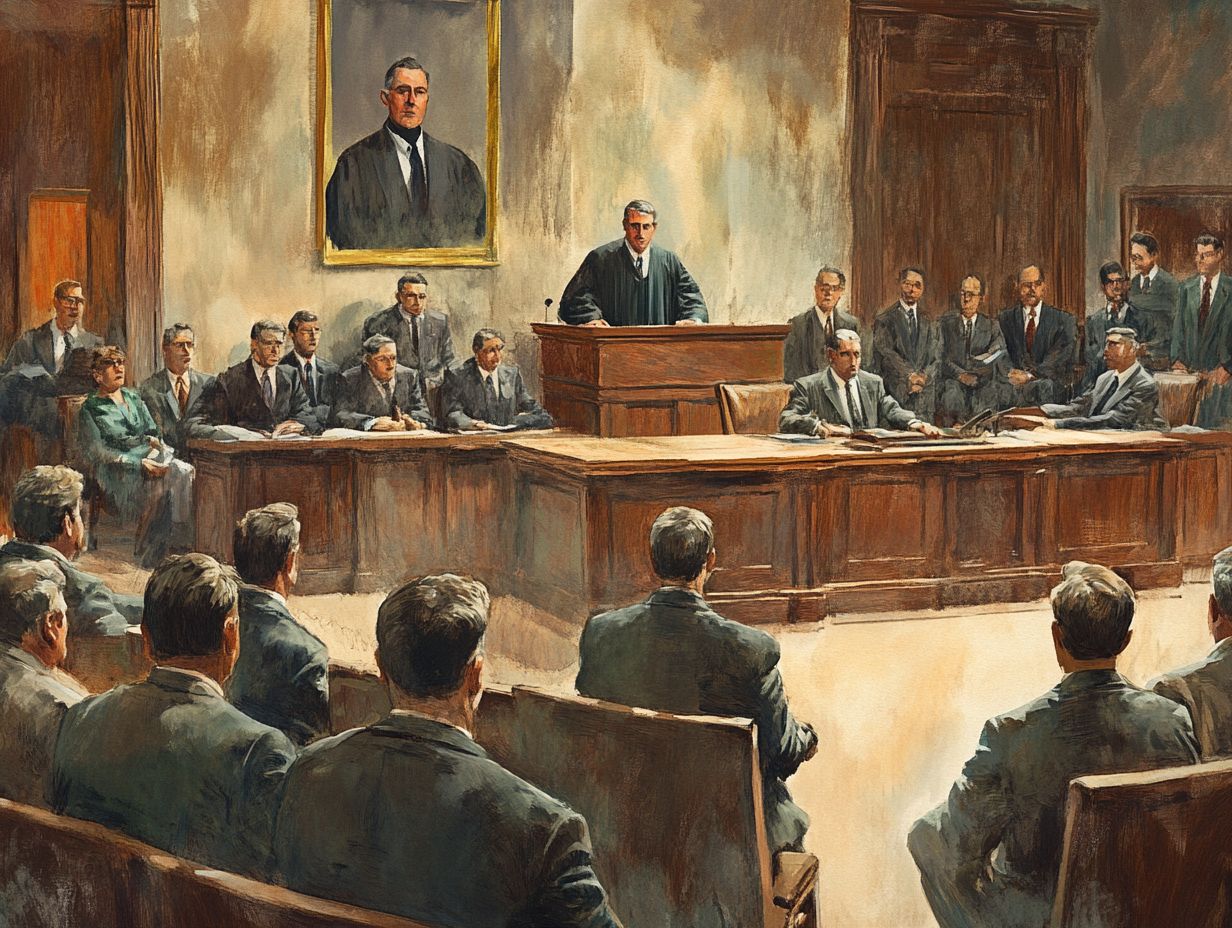
To sidestep IP litigation, it’s essential to adopt best practices in managing your intellectual property. This includes proactive licensing strategies and regular audits of your IP portfolio, which can help you understand notable international IP cases that may influence your approach.
By establishing clear licensing agreements, you create a robust framework that outlines both rights and responsibilities. This significantly reduces misunderstandings that might lead to legal disputes.
Staying informed about competition law is crucial as it helps you understand complex rules surrounding intellectual property regulations.
Examining case studies of companies that have successfully implemented these measures offers valuable insights. For instance, a tech startup that conducted thorough audits and trained its staff on IP policies minimized accidental infringements.
This approach cultivated a culture of IP awareness, safeguarding innovations and enhancing its competitive edge.
What Are the Potential Consequences of Losing an IP Litigation Case?
Losing an IP litigation case can have serious repercussions for your business, including financial setbacks, damage to reputation, and limitations on operations. To avoid these issues, consider exploring 5 ways to leverage IP rights in litigation.
These outcomes affect immediate revenue and can obstruct future licensing deals and partnerships. If your company is embroiled in litigation, potential collaborators might view you as a high-risk associate, making them hesitant to negotiate deals.
For example, a well-known software firm that lost a patent infringement case experienced a noticeable decline in collaborative opportunities, as partners were reluctant to align with a brand seen as legally vulnerable.
This scenario is a wake-up call! A single setback can ripple through your company s network, underscoring the need for a robust legal strategy to preserve trust and credibility within your industry.
What Are Some Tips for Businesses to Protect Their Intellectual Property?
To effectively safeguard your intellectual property, implement robust strategies that include thorough licensing agreements and regular assessments of your IP landscape.
Actively monitoring your IP environment helps you spot potential infringements early and take necessary corrective actions. Staying informed about the latest legal developments in IP rights is vital; this knowledge equips you to adapt your strategies proactively.
For instance, major corporations like Apple continuously review their trademarks and patents to ensure they re fortified against violations. Employing dedicated IP teams or consulting with legal experts significantly enhances your ability to navigate the complex landscape of intellectual property.
This fosters innovation and preserves your competitive advantages.
How Can IP Litigation Impact the Future of a Business?
IP litigation can profoundly shape the future of your business, affecting brand reputation, financial stability, and competitive positioning in the market. To prepare effectively, consider these 5 ways to strengthen your IP case before litigation.
If your company is involved in legal disputes, you might notice a dip in consumer trust as stakeholders evaluate potential fallout. For instance, if a tech firm faces patent infringement claims, stock prices may fluctuate as investors react to the uncertainty surrounding the case.
However, many businesses view these challenges as growth opportunities. Those who adeptly navigate IP litigation can emerge with a stronger identity, having refined product offerings or improved internal processes based on insights gained.
Companies like Apple have transformed past legal battles into stepping stones for innovation, solidifying their market presence and maintaining a loyal customer base, even in the face of adversity.
Frequently Asked Questions
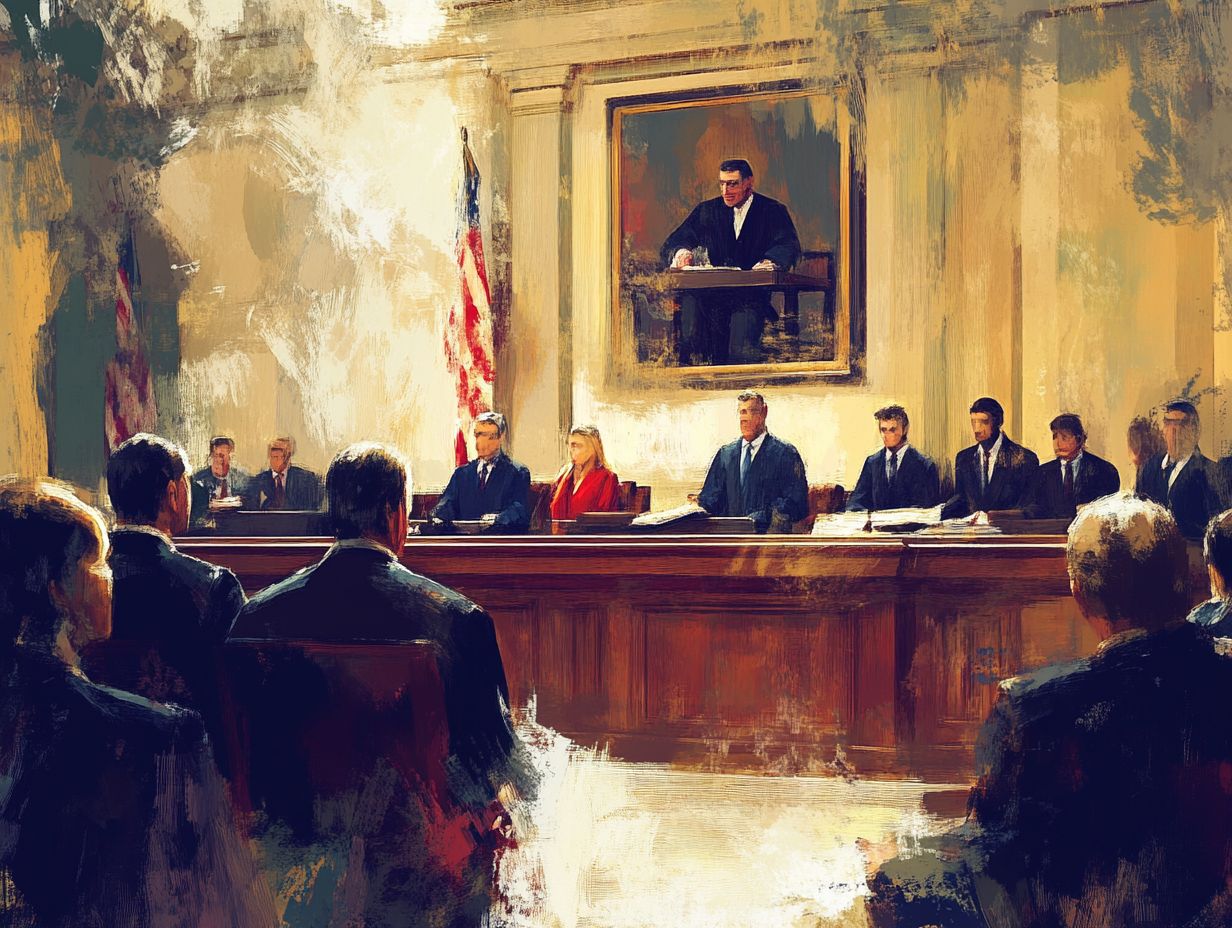
Take charge of your intellectual property today to secure your business s future!
What are the 5 most important lessons learned from major IP litigation cases?
The 5 most important lessons learned from major IP litigation cases are:
- The importance of protecting your intellectual property from the outset.
- The potential consequences of not properly protecting your IP.
- The role of thorough research and due diligence before filing a claim.
- The complexities of navigating the legal system in IP cases.
- The impact of setting precedents for future IP cases.
How can protecting your intellectual property from the outset prevent major IP litigation cases?
Protecting your intellectual property right from the start establishes your ownership and rights over your creations. This action can deter others from infringing on your IP and potentially leading to a major litigation case. Proper documentation and records of your IP provide stronger legal grounds to defend your rights.
What are the potential consequences of not properly protecting your IP?
The potential consequences of not properly protecting your IP include:
- Loss of control over your creations.
- Missed opportunities for revenue and growth.
- Damage to your reputation.
- Costly litigation cases.
- Loss of exclusive rights and market advantage to competitors.
Why is thorough research and due diligence important before filing an IP claim?
Thorough research and due diligence are crucial in IP cases, as they help determine the strength of your claim and potential defenses. This includes conducting a comprehensive search for existing patents, trademarks, or copyrights, known as prior art, that may affect your case. Identifying potential weaknesses or risks in your claim allows you to strategize and prepare effectively.
Navigating the legal system in IP cases can be complex and requires specialized knowledge. Understanding the various laws and regulations governing IP, as well as the procedures and timelines involved in filing a claim, is essential. For those looking to deepen their understanding, exploring the 5 most influential books on IP litigation can provide valuable insights. Working with attorneys and experts familiar with IP litigation can guide you through the process.
How can major IP litigation cases set precedents for future cases?
Major IP litigation cases can set precedents by establishing legal standards and interpretations of laws related to IP. Such cases shape the outcomes of future disputes and guide courts in similar cases. To navigate this complex landscape effectively, it is important to be aware of the 5 pitfalls in IP litigation to avoid, as staying updated on current IP litigation is crucial to understand its potential impact on your own IP rights.

